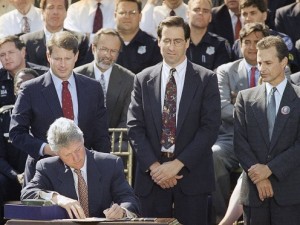In the current dust up over criminal justice reform, I see a deeper story of how our flaws as human beings keep us from realizing racial equality.
Bill Clinton seems to be stuck between a rock and a hard place. On one hand he wants to help Hillary Clinton’s presidential bid, on the other hand he wants to defend the legacy of his presidency against claims that his 1994 Violent Crime Control and Law Enforcement Act helped drive mass incarceration. This conflict played itself out publicly last Thursday when Bill Clinton was confronted by angry protesters while he was giving a speech at a rally for Hillary Clinton. The former president defended his policy by arguing that his crime bill actually helped to save Black lives by driving down murder rates. This response was interesting because a few months ago, Clinton admitted that the law made mass incarceration worse, which is in line with the current sentiments among Blacks, who represent a key voting block that Hillary Clinton needs if she wants to be president.
So which one is it, did that 1994 Act save lives or did it contribute to mass incarceration? According to a new article from a Fordham Law School professor, the answer is: neither. In his article John Pfaff argues that the law had a minimal influence in the drop in crime rates during the 1990s and that it also did not substantially contribute to mass incarceration. First, by 1994, the prison population had already tripled since 1974. Second, the law’s harsh sentences only applied to people sentenced for federal crimes, which only amounted to 13% of the prison population at that time. Third, the prison population actually declined for the last six years after the law was signed.
Given that both Bill Clinton and the protestors got it so wrong about the 1994 law’s effect on mass incarceration, it made me wonder whether the conventional wisdom about mass incarceration itself can withstand statistical analysis. It’s true that the prison population exploded at the end of the twentieth century and that minorities were disproportionately represented therein. However, were the harsh sentencing laws motivated by racial prejudice?
In the corner of mass incarceration being motivated by racial prejudice, we have familiar talking points like these:
- The Controlled Substances Act established a minimum mandatory sentence of five years for a first-time trafficking offense involving over five grams of crack (perceived as a Black drug), as opposed to 500 grams of powder cocaine (perceived as a White drug); and
- Blacks are more likely to be arrested for drug crimes, even though they use drugs at similar or lower rates than Whites.
On the other hand, a recent article by Barry Latzer, argues that violent crime, not drugs, led to higher imprisonment rates. He presents a couple of intriguing points:
- The rate of violent crime surged by 350% between 1960 and 1990; and
- Drug convictions explain only “about 20% of prison growth since 1980.”
So who’s right?
To a certain extent, I’m not sure it really matters what the motivation was. Though I suspect that one’s answer to that question gives us insight into the human condition.
“The heart is deceitful above all things, and desperately sick; who can understand it.” (Jeremiah 17:9) (ESV)
One way that I see this verse play out in life is that people often think they are more capable of being objective than they actually are. In my experience talking to friends and watching commentators discuss different issues, people think they’ve fairly considered both sides of an issue, but you can tell they haven’t because they are often unable to articulate the best argument for the opposing view. If they can state the opposing view at all, it’s usually a weak argument that can be easily dismissed, which gives them a false confidence that their view is superior.
Also, when deciding there own stance, people have a tendency to focus on the facts that fit most comfortably into their worldview, while ignoring the facts that don’t. Given the history of severe oppression of Blacks in America, from slavery to Jim Crow, some will see this country as racist, no matter what. Any discussion about public policy with such a person starts from the presumption that those who disagree with them are racially biased. On the other side, there are those who believe that race is never an issue these days because we’ve elected a Black President. They refuse to consider that both conscious and unconscious bias toward Blacks still persists today. They are likely to attribute Black issues to character failings. These two factions prevent us from moving forward and I believe we all fall into one or the other extreme on occasion, some more than others. We become incapable of giving the other side the benefit of the doubt and find it difficult not to assume the worst in others. I believe that we will never be able to solve any of the nagging issues of our time, whether its gun laws or terrorism, without being able to overcome this tendency.
When it comes to mass incarceration, it seems that it is plausible that harsh sentencing was a reaction to increases in violent crime. However it is also plausible that politicians and others were fine with the disproportionate impact these laws had on Blacks because they were indifferent to our suffering or assumed that Blacks were prone to crime. Nonetheless, when we pay too much attention to defending mass incarceration as a legitimate reaction or condemning it as racially biased, it prevents us from being able to analyze whether it was worth its fiscal and social costs, so that we can move forward.
In the end, each of us needs to ask ourselves whether we’ve actually taken the time to consider this and other vexing societal issues from our opponent’s point of view. How can progress be made if we don’t take the time to do that?
